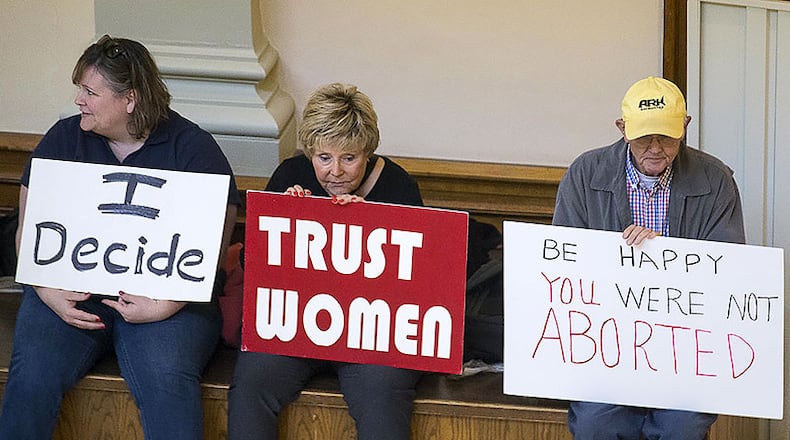Georgia is not the only state considering legislation this year dealing with abortions.
Georgia Gov. Brian Kemp signed a bill that would ban most abortions once a doctor can detect a "heartbeat" in the womb — which supporters say happens around six weeks of pregnancy, before many women realize they are pregnant. Kemp has said he will sign the bill.
Several other Southern states have either passed or are considering heartbeat bills. Here’s a look at the status of those bills:
Kentucky -- Gov. Matt Bevin signed a bill on March 9 that would make abortion after a heartbeat is detected a felony with the only exception being when a mother's life is in danger. Hours later a federal judge temporarily blocked the law. Five days after that, a judge blocked another Kentucky law that sought to ban abortion for reasons of race, gender and disability. Both laws have been suspended while a federal judge considers lawsuits challenging them.
Louisiana -- Democratic Gov. John Bel Edwards signed a heartbeat bill on May 30.
Missouri -- On Aug. 27, a federal blocked key parts of a massive anti-abortion bill from taking effect until the matter is settled in court. The bill, which banned banned all abortions after 8 weeks with no exceptions for rape or incest, also had provisions to ban the procedure at later times should the 8-week ban be struck down. The judge allowed a section of the law which included banning abortions on the basis of race, sex or diagnosis of Down syndrome.
Mississippi -- Gov. Phil Bryant signed a heartbeat bill on March 21. A federal judge has temporarily blocked the law until a court decides its fate. Last year, a judge blocked a less-restrictive bill that would've banned abortion after 15 weeks.
Ohio -- Gov. Mike DeWine signed a heartbeat bill on April 11. The law was blocked on July 3 while a federal judge considers a lawsuit challenging the restrictions.
South Carolina -- The House passed a hearbeat bill on April 24. This bill allows exceptions for cases of rape, incest or if the life of the mother is in danger. The Senate is considering the bill.
Tennessee -- A heartbeat bill has passed the state House on but failed to pass the Senate. Lawmakers later sent a trigger bill that would outlaw abortion if Roe v. Wade is overturned.
>> Kemp signs anti-abortion ‘heartbeat’ legislation, sets up legal fight
Abortion rights groups vow payback as Kemp preps to sign ‘heartbeat’ bill
Other states are considering different ways to restrict or in some cases expand abortion rights.
Alabama -- Gov. Kay Ivey signed a bill on May 15 that makes performing an abortion a felony punishable up to life in prison. There are no exceptions for rape or incest. The only exception would be if a mother's life was in danger. The law is scheduled to take effect on Nov. 15 and a lawsuit challenging the law has been filed.
Arkansas -- Gov. Asa Hutchinson has signed two anti-abortion bills this year. On Feb 19, he signed a bill legislation that would outlaw abortion if Roe v. Wade is reversed. The other bill, which bans abortion after 18 weeks, was signed on March 15. Planned Parenthood and the American Civil Liberties Union have sued to overturn the law.
New York -- On Jan. 22, Gov. Andrew Cuomo signed a law that codifies Roe v. Wade into state law, which would allow abortions to remain legal even if the court decision is overturned. Late-term abortions are now legal if a mother's life is threatened or the fetus is not viable. The law also allows health care professionals such as nurse practitioners or physician assistants to perform abortions.
Oklahoma -- The state Senate approved a bill on March 14 that proposes a constitutional amendment ballot issue that would allow voters to indicate that the state constitution does not protect the right to an abortion.
Vermont -- Republican Gov. Phil Scott signed a bill on June 10 that declares a right to abortions without restrictions.
About the Author
Keep Reading
The Latest
Featured




